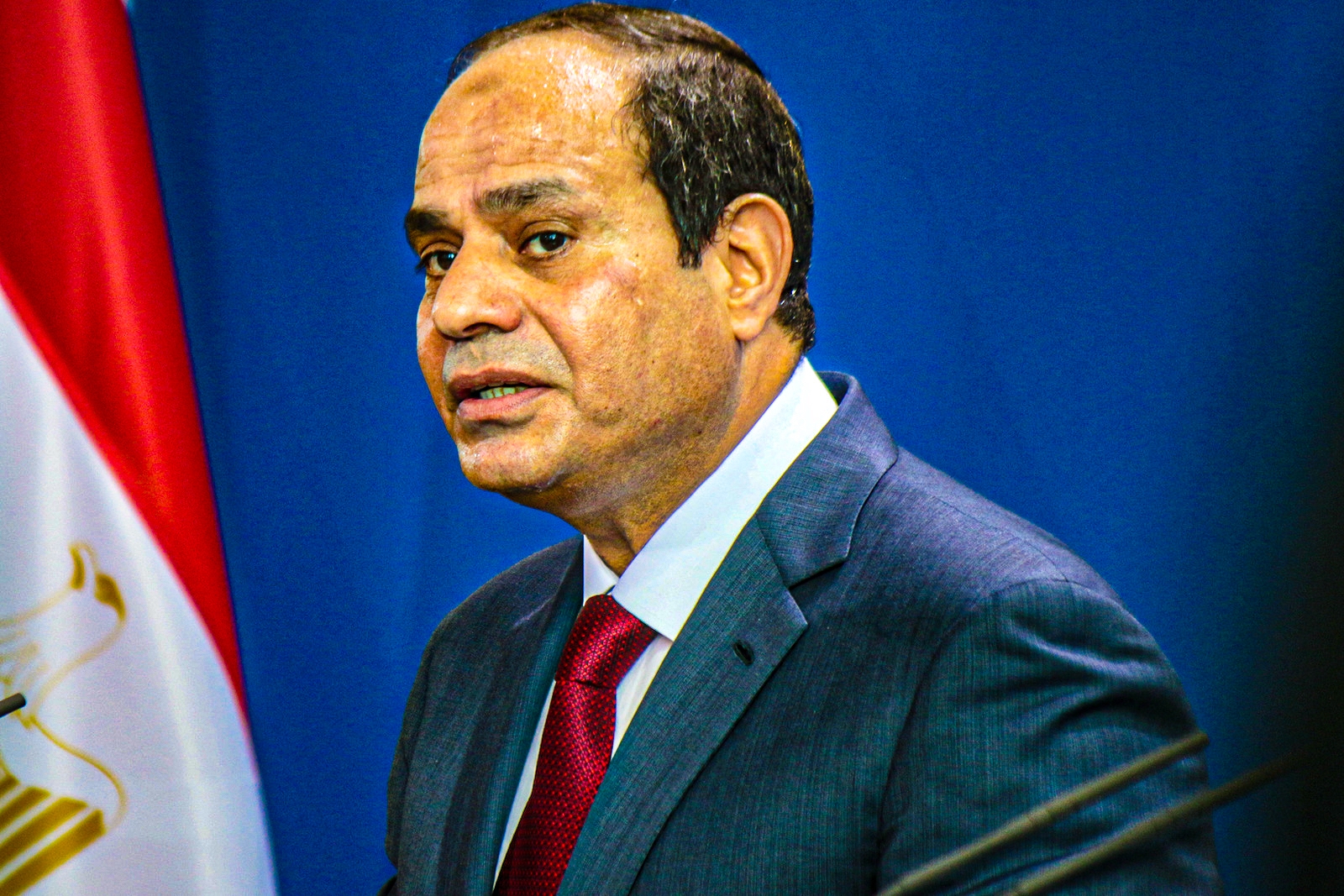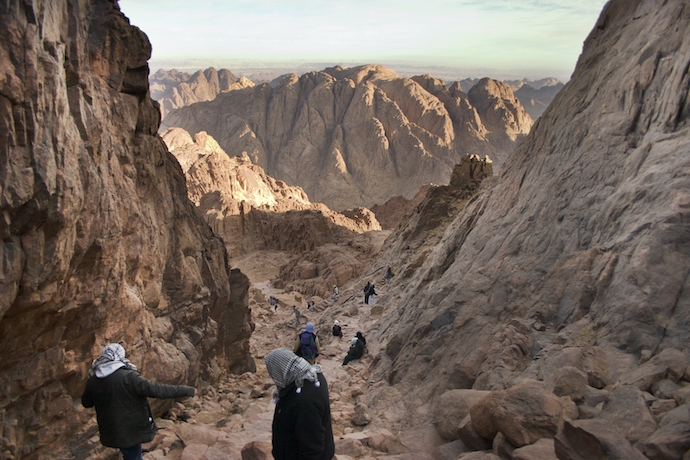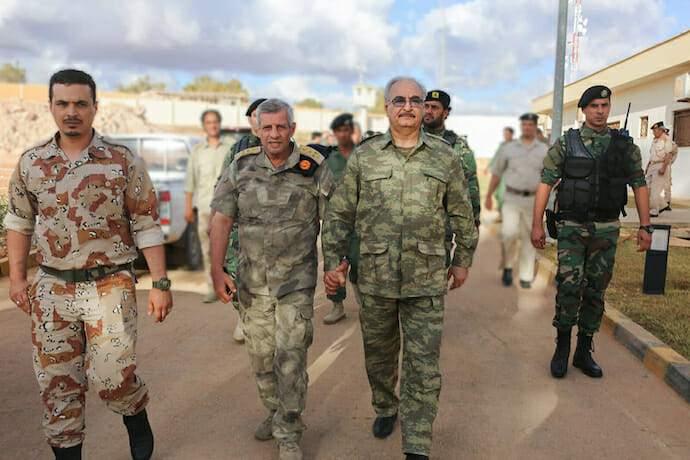
Egypt is Concerned about Libya
A possible resumption of violence in Libya only adds to Cairo’s worries about Libya’s increasingly uncertain future. Cairo has long been concerned about how turmoil in Libya can breed instability in Egypt, as it has done in Tunisia, Algeria, and Mali. Abdel Fattah el-Sisi, Egypt’s president, is carefully adapting to new realities in Libya and addressing them more pragmatically. To mitigate against certain risks and protect certain national interests, Egypt has recalibrated its foreign policy in relation to Libya since the ceasefire of October 2020, making Cairo more of a diplomatic actor. However, new realities in the country could lead to Egypt returning to its more interventionist approach to its western neighbor.
Chief of the Sisi administration’s concerns in Libya are political Islam and Turkish influence. Put simply, Cairo does not want to see the consolidation of an Islamist-dominated political system in any neighboring country. Egypt’s government views the Muslim Brotherhood and all its offshoots as terrorist organizations that must be corralled and neutralized to the maximum extent possible. To advance this agenda, Sisi’s administration has not only cracked down on the movement inside Egypt, but also worked with strongmen in other Arab countries working for the same goal — including General Khalifa Haftar in Libya, President Kais Saied in Tunisia, and President Bashar al-Assad in Syria.
Egypt, along with its closest allies in the Gulf—Saudi Arabia and the United Arab Emirates (UAE)—have countered the forces of political Islam since the Arab Spring uprisings erupted in 2010, and much more aggressively after the coup that toppled Mohammed Morsi in 2013, forcing political Islamists from power. By pushing longstanding narratives about fighting extremism, these Arab powers have sought to bring the West on board with their anti-Islamist campaigns, especially when working to undermine “moderate” Islamists such as Ennahda in Tunisia, which had gone so far as to refashion itself as “Muslim Democrats” on a German Christian Democratic model.
Yet observers see such agendas as geared toward not only effacing Islamists, but also eroding forces in the region that are promoting democratic reforms. This applies to many groups that challenge the region’s authoritarian status quo, regardless of whether they are Islamist, secular, conservative, or liberal. This has been key to Egypt’s Libya foreign policy since the 2013 coup and the eruption of Libya’s civil war the following year.
“Preventing democracy in the [Middle East and North Africa] is a key element of Sisi’s foreign policy; Sisi views democracy either in Libya, Sudan, Tunisia, or elsewhere, as a grave danger to his rule,” Dr. Khalil al-Anani, a Senior Fellow at the Arab Center Washington DC and an Associate Professor of Political Science at the Doha Institute for Graduate Studies, said in an interview with International Policy Digest.
“Therefore, it is a redline for Sisi, and the junta, for Libya and Sudan to have a stable and democratic government as it might spread and repeat the Arab Spring once again. It also can aspire Egyptians to rise against military rule. On Libya specifically, Sisi’s stakes in Libya are very high as they include economic, energy, strategic, and security benefits. Therefore, having free and fair elections in Libya might jeopardize these interests particularly if Sisi’s allies, [Haftar and Aguila Saleh] lost. The best scenario for Sisi is to maintain the status quo by minimizing its impact on Egypt’s security.”

Beyond fears of democracy one-day taking shape in Libya, the Egyptian government has legitimate security concerns that inform its perspective on Libya’s current situation. Forces such as Da’esh and al-Qaeda-affiliated groups that maintain a residual/low-level presence in Libya constitute a real security threat to Egypt, which is already facing a terrorism crisis in the Sinai. “In fact, the two are linked in that arms from Libya have flowed to the Sinai conflict,” added Dr. William Lawrence, a professor at American University. “Egypt sees the triple threat of political Islam, Turkey in Libya, and Salafist extremism as inextricably linked to each other and to its internal security threats. For these reasons Egypt seeks some kind of protective barrier in eastern Libya.” Cairo fears that extremist groups could exploit any political or security vacuum inside Libya to create ‘another Sinai’ on Egypt’s western front. The threat of violence spilling across Egypt’s porous border with Cyrenaica into Egypt has been a constant fear for Egypt’s administration, making the securitization of Egypt’s western border a high priority for Sisi.
Regarding Libya, “the most important [political priorities for Cairo] are always [Egypt’s] national security and domestic stability, and the only way to achieve them in a long-term solution would be a stable nation-state Libya for feasible border protection and an increase in trade,” Dr. Alessia Melcangi, a senior fellow at the Atlantic Council, told International Policy Digest. “But at the same time, Egypt cannot allow the creation of a united Islamist oriented government strictly linked with Turkey. For this reason, in the short-term, Egypt supports specific actors in the East of Libya that share with [Sisi] the same ideology and fights against political Islam, such as General Khalifa Haftar, thereby actively acting against state-formation efforts.”
Amid Libya’s civil war, Egypt was one of Haftar’s main state sponsors. Cairo viewed him as a strongman who could establish an Egypt-friendly and anti-Muslim Brotherhood order in eastern Libya that would serve as a protective buffer, ostensibly to keep Libya’s Islamist militias away from Egypt. “Ironically, the Libyan core of Haftar’s militias were Madhkali Salafists, who were far more Islamist than Libya’s western militias,” explained Dr. Lawrence. “But Egypt found those Islamists palatable because they were more politically quietist. Egypt always viewed Haftar’s Salafist forces as a marriage of convenience, just like Sisi’s own marriage of convenience with the Salafist Nour Party after the 2013 coup.”
After the Libyan civil war came to a relative halt in August 2020, Egypt devoted significant diplomatic energy to backing the UN-led peace process as well as Prime Minister Abdel Hamid Dbeibah’s government. In December 2020, Egypt sent a delegation of diplomats and intelligence officials to western Libya to meet with the Tripoli-based Government of National Accord (GNA), marking the first talks between Cairo and Libya’s internationally recognized government since 2014. The delegation’s trip to Tripoli signaled a shift in Cairo’s positioning vis-à-vis Libya. By restoring diplomatic relations with the GNA, Egypt sought to minimize the risks of a military escalation with actors in Libya. This move also allowed Cairo to refocus on other priorities — including the security crises in the Sinai and disputes with Ethiopia over the Grand Ethiopian Renaissance Dam (GERD) — and avoid new or exacerbated problems in Libya.
This shift in Egypt’s Libya policy has much to do with Cairo’s realizations that Haftar’s westward campaign to usurp control of Tripoli and other parts of western Libya was a failure. “Egypt’s role in Libya has changed according to the shifting sands in the conflict-torn country, where the high level of volatility imposes a flexible approach to navigate unpredictable circumstances,” explained Dr. Umberto Profazio, a Maghreb Analyst at the NATO Defense College Foundation, in an interview with International Policy Digest.

“Cairo’s staunch support for the Libyan National Army (LNA) has gradually decreased in the past couple of years as the Egyptian regime has progressively realized that the military capabilities often claimed by General Khalifa Haftar were not enough to tilt the balance in his favor, as shown in the latest round of fighting,” added Dr. Profazio.
Stability in Libya is highly important to Egypt because of economic considerations. The conflict has led to a drastic decrease in remittances that Egyptian workers in Libya had been sending home. And with the majority of Libya’s economic livelihood and population in the western part of the country, not the East, it makes sense that Cairo was still willing to engage with the GNA despite Egypt’s staunch support for Haftar and the Tobruk-based administration. With the Egyptian economy suffering from the impact of the pandemic and other issues, such economic motivations can’t be underestimated when analyzing Cairo’s perspective on Libya’s complicated situation.
“For Egypt, Libya is an interesting and important economic partner,” explained Wolfgang Pusztai, the former Austrian Defence Attaché to Libya who currently serves as the Chairman of the Advisory Board of the National Council on U.S.-Libya Relations. “Before the revolution, about 1.5 million Egyptians worked in Libya as Egyptian migrant workers, not only in the neighboring Cyrenaica, but also in western Libya. Keeping the tense situation of the domestic labor market in mind, this is of very high significance for Egypt. The large Egyptian construction enterprises and other companies want to get their share in the rebuild of Libya. Just recently, a major contract for constructing a Third Ring Road around Tripoli was awarded to an Egyptian company.”
Egypt is also concerned about Turkey, which played a major role in defeating Haftar’s forces in 2020. Despite major improvements in Egyptian-Turkish relations, or perhaps undergirding that rapprochement, officialdom in Cairo still worry about Ankara’s agenda in North Africa. “A sustained Turkish military presence in Libya is a threat to Egypt’s national security interests, as it also supports Islamist groups in Libya and could provide offensive capabilities to the so-called ‘Operation Volcano of Rage’, the militia coalition that defeated Haftar’s LNA at the gates of Tripoli in 2020. Without Turkish support, there is no way that Operation Volcano could successfully advance into the east,” said Pusztai. “Egypt’s President el-Sisi was—and still is—aware of the possibility of a Turkish supported military offensive to take at least the Oil Crescent in the Sirte Basin and declared a ‘Red Line’ west of Sirte—Al Jufra. A violation of this line would trigger an Egyptian military intervention.”
Knowing that Libya is vital to its long-term interests, Cairo has serious concerns about the UN-backed peace process in Libya leading to a situation that undermines Egypt’s presence in the country and promotes Ankara’s. “Cairo may find its interests insufficiently represented by the electoral results, especially if there is a concrete risk of the creation of an Islamic-oriented new interim government in the West,” said Dr. Melcangi. “It is very improbable to see Egypt back a government that could have a link with the Muslim Brotherhood and with its main supporter, Turkey. This is a risk that [Sisi] does not want to run, not even for a general agreement with Ankara, because he considers the organization a national security threat. Although the two countries are working to find a way to relaunch their diplomatic and political ties, Egypt remains enough diffident and worried about Ankara’s interest in military cooperation and the export of weapons in Libya.”
Cairo’s priority in Libya is a stable neighbor that does not represent any security or ideational threats to Sisi’s government. Although Turkey and Russia seem to have established themselves “kingmakers” in the conflict — with the Turkish military and Russian Wagner Group serving as the dominant external forces capable of shaping the North African country’s security architecture — Sisi’s own ambitions can’t be discounted. “If the primary goal of Egypt in Libya is the securitization of its Western border and contributing [to the] stabilization of Libya in an Egyptian way (i.e. supporting a military government), it’s crystal-clear how this crisis represents an important testing-ground for el-Sisi’s regional ambitions and his domestic reputation,” according to Dr. Giuseppe Dentice, the head of the MENA Desk at the Center for International Studies and teaching assistant at the Catholic University of the Sacred Heart in Milan. “This means that Egypt aims to bolster itself as ‘kingmaker’ in the country.”
At this juncture, there is a real possibility that Libya’s political process will fall apart, and the country will slide back into a violent military conflict. On February 10, Libya’s eastern-based parliament, which is aligned with Haftar, announced the previous administration’s Interior Minister Fathi Bashagha as its new prime minister, angling to replace the current prime minister, Abdel Hamid Dbeibah, who was elected last year by a UN-led process. Egypt was the first and only country so far to congratulate Bashagha for his victory, as other countries waited to see what the dueling prime ministers’ camps might negotiate. Dbeibah’s refusal to cede his position to a prime minister appointed by the eastern parliament, the same parliament that played a key role in supporting Haftar’s assault on Tripoli and in delaying December 24 elections, could lead to another political standoff, which itself could lead to a resumption of political violence. That violence could threaten Egypt’s myriad of interests in Libya.
This turn of events brings us to the role of Russia and Cairo’s budding partnership with Moscow. With the Wagner Group, a shadowy Russian mercenary force that is linked to the Russian state, maintaining thousands of mostly Russian fighters on the ground in Libya, Egypt realizes the importance that this force plays in terms of limiting and countering Turkish hard power in its polarized neighbor.
“The Wagner Group provides the backbone for the LNA’s air force, especially for the Su-24 and MiG-29 fleet, and serves and services some other sophisticated weapon systems, e.g. air defense missiles,” explained Pusztai. “Some Wagner mercenaries on the ground could act as some kind of tripwire in the case of a large offensive towards the east, to buy some time for an eventual Egyptian intervention. I am sure Egypt has realized this, but I don’t think they are interested in any sustained Russian military presence in Libya.”
The Egyptians realize that within the Egypt-Russia-UAE triangle, Egypt is the junior partner. There is also a realization that Cairo, Moscow, and Abu Dhabi do not necessarily share all of the same interests in Libya and their agendas do not always align. But as Libya risks teetering towards violent conflict once again, it is safe to assume that the Sisi administration would have no choice but to turn to Russia and the UAE for support in terms of securitizing eastern Libya and preventing Turkish-backed forces as well as other Islamist or jihadist militias from posing a more dire threat to Egypt’s national security and Cairo’s ideological agenda in the wider Arab-Islamic world.

